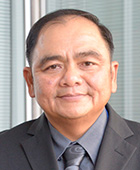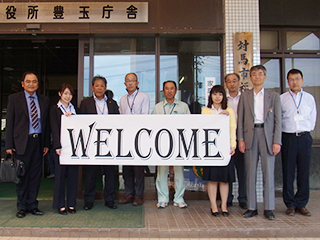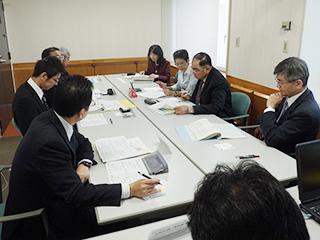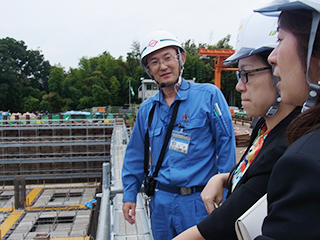2nd Batch Fellows (FY2016-)
Here you can view reports on visits to Japan by the 2nd batch fellows who started the SPRI program in 2016.
*The information about the fellows is correct as of the interview.

Mr. Satapong Soontararak(Thailand)
Director, Division of Local Education Development, Department of Local Administration, Ministry of the Interior
POLICY ISSUE: Local governance
Mr. Satapong has worked in Thailand’s Ministry of the Interior for 32 years. He was the director of the Bureau of System and Organizational Structure Development and now he is the director of the Division of Local Education Development in the ministry’s Department of Local Administration, where he is involved in areas such as surveys towards the development of local government systems and structures. Mr. Satapong is also involved in regional devolution work, carrying out research to support the creation of effective policy proposals related to the municipal mergers being carried out by the Thai government.
With the cooperation of the Ministry of Internal Affairs and Communications, the SPRI program facilitates visits to local governments with municipal merger experience and exchanges of opinions with prefectural and city offices.
Left: At the Toyotama office of Tsushima city (on the 1st research visit to Japan), Right: Learning about the effects of municipal mergers at the Aomori prefectural government (on the 2nd research visit to Japan)
<Comments from Mr. Satapong>
■After 2nd research visit to Japan (October 2016)
Solid local government operation and effective administrative service provision through the merger of local authorities
Thailand has approximately 7,850 local authorities. Many of them are small and face the problem of being fiscally unable to provide adequate administrative services to residents. In that light, the Thai government is looking into mergers of local authorities. However, in Thailand many local governments have a negative view of mergers, so I believe that two keys to success with mergers are enlisting the support of provincial leaders in convincing the residents in their areas and putting legal merger standards in place. We are making efforts to improve the related laws, and in that work the examples of Japan’s great Showa mergers are very useful.
The research visits to Japan which are part of the SPRI program allowed me to visit specific areas that have experienced mergers, so as to exchange opinions with leaders and employees and to consider the background of the success or failure of mergers. Furthermore, by visiting those areas, I gained an understanding of regional uniqueness: culture and lifestyle differ in the mountains, outlying towns, and urban areas. I think this perspective is very important in municipal merger work. I also feel that Japan is very skilled in decision making. I was very impressed by the fact that in Japan mergers weren’t forced on the local residents, but rather negotiations would go on at length, sometimes for as long as six years, until an agreement was reached.
■After all research visits to Japan (February 2018)
We’ll start with a trial implementation. The process leading to agreement is paramount
I had heard that administrative systems in Japan were top class, and through the SPRI program I had the chance to actually see them for myself. I visited local governments of various scales across Japan, holding discussions with stakeholders and learning about the state of mergers of municipalities. Based on the results of my research, in November 2017 I made a policy proposal regarding mergers of regional local governments in Thailand. It was accepted by the majority of attendees. However, some voiced concerns that given the current situation in Thailand it would be difficult to set the criteria for mergers as local governments with a population of below 7,000. Therefore we are considering trial implementation for a few local governments that have already expressed their desire to merge. Indeed, one of the things I learned from this program is that mergers should never be forced. I am extremely glad that I was able to participate in such an excellent program.

Ms. Nguyen Thi Thu Hong(Viet Nam)
Director, Department of International Cooperation and Science,
Technology of the General Department of Land Administration (GDLA)
POLICY ISSUE: Land acquisition management
Ms. Hong is the director of the Department of International Cooperation and Science, Technology of the General Department of Land Administration (GDLA) in Viet Nam’s Ministry of Natural Resources and Environment, where she is responsible for all international business, including scientific surveys and technology transfer in the field of land management. She is conducting research towards proposals of means to ensure that the policies and rules governing land acquisition and compensation in Viet Nam are optimally fair, effective, and transparent. The SPRI program, with the cooperation of the Japan’s Ministry of Land, Infrastructure, Transport and Tourism, supports research supervision by GRIPS professors, discussions with people in charge of operations in government agencies and visits to companies involved in land development.
Left: Case studies about land readjustment (Ministry of Land, Infrastructure, Transport and Tourism, on the 2nd research visit to Japan), Right: Site visit to a Yokohama Ring Expressway construction site (on the 2nd research visit to Japan)
<Comments from Ms. Hong>
■After 2nd research visit to Japan (September 2016)
Improvements to Viet Nam’s land acquisition system
GDLA has made great efforts to acquire high-quality theoretical and practical knowledge through activities such as workshops on land management held in Viet Nam with the cooperation of Japan’s Ministry of Land, Infrastructure, Transport and Tourism. Although land acquisition and compensation policy have been improved in Viet Nam, the actual implementation of the policy still has some issues, and this has led to delays in many public works investment projects. In order to efficiently provide fair compensation for land acquisition, and to make legal improvements, it is necessary to establish detailed guidelines and work flows.
The SPRI program research trips to Japan provide not only research supervision at GRIPS but also many opportunities for discussion with project leaders at relevant governmental agencies and ministries and with Japanese companies on the development and investment side. I feel this is a very effective way of hearing the opinions of a range of stakeholders. However, I believe that when it comes to applying this approach in Viet Nam, it is important to consider the background and conditions in detail, and to exchange opinions with the people in charge of technology so as to decide on appropriate timing. For example, I think Japan’s public involvement method for incorporating public opinion in proposals and works plans is effective, and it is our challenge to implement this method in the same manner in Viet Nam.









